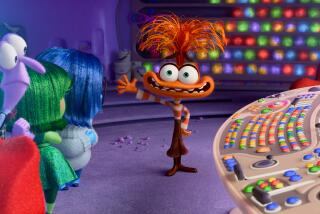Troubled ’47 Ronin’ may be headed for a box office reckoning
<i>This article has been corrected. See below.</i> — In “47 Ronin,” Keanu Reeves portrays the leader of a band of ronin — masterless samurai in 18th-century Japan who must suffer the indignity of having no one to lead them in battle. Turns out that plot line provides an apt metaphor for the period 3-D sci-fi epic’s problem-plagued odyssey to the screen.
“47 Ronin” arrived in theaters Christmas Day as one of the most troubled movie productions in recent memory, as well as one of 2013’s most spectacular flops-in-the-making.
According to pre-release awareness surveys, the revenge thriller, which cost at least $175 million to produce, is on track to earn around $20 million in its opening five days. Such a weak box-office haul would put “47 Ronin” in the top tier of big-budget Hollywood failures, ranking alongside “John Carter,” “R.I.P.D.” and “The Lone Ranger” in the “when tentpole films go horribly wrong” category.
PHOTOS: Greatest box office flops
Moreover, the film’s distributor, Universal Pictures, has taken a rare pre-emptive write-down on the cost of “47 Ronin” — a charge on the studio’s income tax statement to offset substantial losses. Even on the heels of hugely profitable films for Universal this year (including “Fast and Furious 6” and “Despicable Me 2”), it’s a move that signifies the white flag of defeat to industry observers.
“Universal Pictures regularly evaluates its film slate for potential adjustment,” the studio said in a statement to the Los Angeles Times. “In the case of ’47 Ronin,’ we adjusted film costs in previous quarters and as a result of our financial performance will not be negatively impacted by its theatrical performance.”
Earlier this month, “Ronin” got off to a disappointing start in the country in which the movie is set, grossing just $1.3 million over the film’s opening weekend in Japan. But its difficulties date back to 2011, when shooting began in Budapest, Hungary, and a widely reported difference of vision between Universal and “Ronin” director Carl Rinsch.
PHOTOS: Best films of 2013 | Kenneth Turan
An acclaimed TV commercial director whose short sci-fi film “The Gift” sparked a bidding war between Hollywood studios interested in expanding it into a feature in 2010, Rinsch was filmdom’s hot new thing. He was originally tapped to direct the “Alien” prequel “Prometheus” (before being replaced by Ridley Scott, his mentor and father of his then-girlfriend), but had no experience directing feature films before reaching the “47 Ronin” set.
Loosely based on a legendary 18th-century saga (“Ch¿shingura” in Japanese), the film follows some four dozen samurai who set out to avenge their feudal master after he is forced to commit seppuku (ritual suicide) for assaulting a power-hungry feudal chieftain. Reeves was cast as a character nowhere to be found in the original text — the “half-blood” outcast Kai — despite not having carried an effects-driven action movie across the $100-million threshold in domestic box office since 2003’s “The Matrix Revolutions.”
Universal expected Rinsch to deliver an effects-driven thriller, but according to a January 2012 Hollywood Reporter story, the director envisioned “Ronin” as more of a drama. Even as its $175-million budget reportedly soared ever closer to $200 million (a posting on the entertainment news website the Wrap said “Ronin’s” production budget grew to $225 million; Universal executives dispute that figure), producers and the studio remained unhappy with crucial battle sequences and ordered Rinsch to film scenes beefing up Reeves’ heroism and a romantic sub-plot. (Neither Universal executives nor Rinsch would agree to be interviewed for this story.)
PHOTOS: Best films of 2013 | Betsy Sharkey
In the end, Universal brought in seasoned second-unit director Phil Neilson (“Iron Man,” “Tears of the Sun”) to help film five days of pick-up shots in London last year to get the scenes the studio originally wanted from Rinsch.
But contrary to previous reports, Rinsch was never removed from “Ronin,” according to a person close to the production who was not authorized to speak publicly on the matter. Nor was the director prevented from editing the film, although he did not retain final cut.
“47 Ronin’s” problems didn’t end there, however. Universal pushed the film’s release date back twice — first from pre-Thanksgiving 2012 to last February and then again to this Christmas — in what Hollywood watchers interpreted as yet another sign of impending disaster.
The completed film is visually dazzling and fetishistically — if not authentically — shot through with Japanese cultural touchstones, featuring more ceremonial bowing than perhaps any studio movie in the last half-decade. Amid a cast of A-list Japanese actors, Oscar nominee Rinko Kikuchi (“Pacific Rim,” 2006’s “Babel”) steals scenes as “Ronin’s” shape-shifting witch character. And the movie’s action set pieces are handsomely staged.
Which is to say that “47 Ronin” betrays few signs of the inefficiencies that characterized its production. Still, the reviews have not been kind. The Times’ Mark Olsen described it as “overlong, underwhelming.” And the film will have to gross around $500 million just to break even.
Entering a crowded holiday movie marketplace, “Ronin” will need more than shape-shifting magic and samurai spirit to achieve redemption.
FOR THE RECORD: This article erroneously stated that the film “The Conjuring” was released by Universal Pictures. “The Conjuring” was released by Warner Bros.
More to Read
Only good movies
Get the Indie Focus newsletter, Mark Olsen's weekly guide to the world of cinema.
You may occasionally receive promotional content from the Los Angeles Times.











